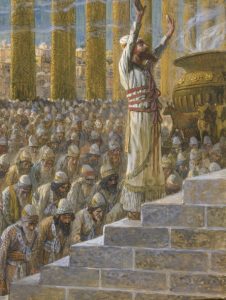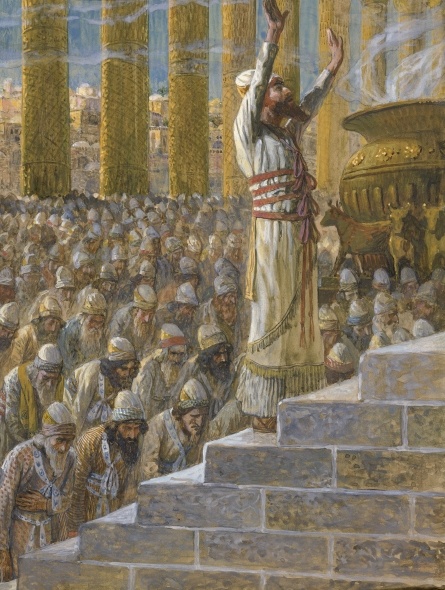Below is the sermon about the workaholic largely as it was preached at MacAlpine Presbyterian Church in Buffalo, New York this morning. New audio link.

Wikipedia says, “In an artistic representation, King Solomon dedicates the Temple at Jerusalem (painting by James Tissot or follower, c. 1896–1902)”
Each one of us at some point or another has probably wondered if our work was in vain. The Solomonic author of Ecclesiastes repeatedly says it all is in vain because we die and leave everything to others who didn’t work for it. I don’t know about you but this really frustrates me because I’m a workaholic. When I was working full-time as a pastor I would get up early, often miss lunch and/or dinner – eating on the run, if at all – and get home late. I had a hard time saying no, so I was over-committed and burning myself out. I’ve been taught to delegate whenever possible, but at first it can take a lot more work to delegate it than to just do it yourself and if you only have the time to do it yourself then you never delegate. But I will tell you that the workaholic, whether they are conscious of it or not, on some level, believes that it all depends on his or her own labor. This belief always leads to the anxiety of wondering if everything that you are doing, if the getting up early and the staying up late, if the skipping meals so that you can get a little more done, the sleepless nights because you cannot stop thinking about your work, the workaholic wonders if this is not all in vain. And when you work and work and work and have nothing tangible to show for it, which is common in ministry, and are surrounded by people suggesting more work that you and only you can do…well that just feeds your anxieties. Now I imagine that I’m not alone, that you too wonder if it all is worth it and wonder what you can do and know that you are not working in vain. This psalm of Solomon was written for us. It is the climax of the song of ascents, which were the psalms that the Jewish people would sing as they ascended the holy hill to worship at the temple. It is therefore also the climax of the fifth book of the five books of Psalms. So despite the fact that this psalm is short, this is a very important psalm.
Psalm 127
I. The basic answer is given in the first couple lines of the poem: if God is not in it then that work is in vain.
A. Solomon begins with a couple of examples that were pretty obvious to the ancient Israelites though perhaps less obvious to us today. The first was about building a house. Solomon knew something about building a house – he was responsible for getting a house built for God that we call the Solomonic temple and he also had a royal palace built for himself. In Chronicles, Solomon is modeled after Bezalel and Huram-abi is modeled after Oholiab. In Exodus, Bezalel and Oholiab were responsible for the tabernacle. The tabernacle was like a temporary temple that could be moved, so the temple in Jerusalem was meant to be a much more permanent replacement. Solomon, just like Bezalel, was chosen by God by name to build, he was from the tribe of Judah, and he got wisdom from God for this work. Solomon actually went seeking God at the altar that Bezalel built when Solomon was given wisdom for building. In Kings we hear about Solomon’s wisdom in general – like the story where he could tell which woman was the real mother of the baby – but in Chronicles he had wisdom for building. For example, in Kings, Hiram praised God for giving David, “a wise son over this great people,” but in Chronicles, Hiram praised God for giving David, “a wise son who will build.” So Solomon was filled with God’s Spirit of wisdom to build when he says, “Unless YHWH builds the house, those who build it labor in vain.” But again, he built both the temple and his own palace. Yet another way to understand this would be more obvious if we translated the phrase, “unless YHWH builds the household, those who build it labor in vain.” Building a household at the very least would include the birth of children. The central promise to King David was that God would build his house. The psalm is intentionally not specific because Solomon means all of these ideas. If God is not in it, then our work at building a home would be in vain – it would all be pointless. So what work can I do and know that it is not in vain? Positively speaking we could say building a home or household so long as God is in it.
B. And the second example was also pretty obvious to the ancient Israelite – “unless YHWH watches over the city, the watchman stays awake in vain.” Solomon not only built the temple and his palace but also the walls around Jerusalem. Cities in that part of the world had people whose job it was to stay awake and watch for incoming trouble. But unless God was watching over that city, it would be pointless for the watchman to stay awake and see it coming. Remember Jericho? It was a walled city with a watchtower and those walls fell and the people of Israel put all of the people of Jericho to the sword except Rahab and her family. So being a watchman is not in vain if God is watching over the city.
II. But then Solomon moves from these couple general examples that were at least pretty obvious to people at the time and he applies it much more broadly and personally, “it is in vain that you rise up early and go late to rest, eating the bread of anxious toil; for He gives to His beloved sleep.”
A. So Solomon takes aim directly at the workaholic and says that it is in vain for you to get up early and work all day, perhaps eating on the run is what he means by “eating the bread of anxious toil,” and going late to rest. This work is in vain because God is not in it. Of course you can find commentaries where the commentator will say that this is no excuse for laziness. They say this because the people who write commentaries get up early, eat as they write, and finish up late. Somehow the commentator has gotten it into their mind that it depends on them rather than on God. Everyone who works in the church is prone to make the same mistake. We think we are doing work for God but sometimes God is not in it. And no doubt you may be thinking if people doing what we call the work of God are working in vain, then how can I know that God is in my work?
B. Well remember that line “for He gives to His beloved sleep.” One of the reasons I do not sleep well is my little faith in God. The question then is whether we really believe that God is in it. Are we burning the candle at both ends because we think that it all depends on us or do we trust God that He is going to work it all out and spend more time with our family? So the person who is getting up early, eating on the run, and working late into the night and not getting much sleep and then wondering if all of it is in vain is actually working in vain because they are not trusting in God. Instead, consciously or not, they are trying to be God. They are trying to be their own Savior. But we have gathered together today not to do good works, but to rest in God and to depend on Him for His grace.
III. And the second half of the psalm, gives us a specific case-in-point: children.
A. Every believer knows that God is in it when we have children. Having children when you know that God is in it will never be in vain. And Solomon says, “Blessed is the man who fills his quiver with them!” A full quiver is twelve, which I will leave to you to ponder. Let’s just say that we should encourage Christians to have more children not less.
B. But the ultimate case-in-point is a particular child who would be born to the house of David and his family the church. This is the only psalm in book five of the Psalms that is by Solomon. And this psalm is at the center of book five and exactly in the middle of the song of ascents. And the basic reason for this is that it is about Jesus and His church. Jesus said, “Destroy this temple and in three days I will raise it up.” The Jews replied, “It has taken 46 years to build this temple and you will raise it up in three days?” The Gospel of John tells us, “But he was speaking of his body.” (John 2:19-21). Then the Epistles explain that we are the body of Christ and that we are the temple of God. The psalm is ultimately about Jesus and His church. Unless YHWH builds the house – the church – those who build it labor in vain. And a major reason for encouraging the house of David, and more specifically the descendants of Solomon, to have children includes the birth of that particular child – the Christ. [Here I can note that the reason for going from Psalms to Ecclesiastes to Chronicles. The expectation of a Messiah to come was that He would build a temple. The second temple was a disappointment – those who remembered seeing the first temple were really let down when they had expected a much more glorious temple, Herod’s improvements to the second temple had taken 46 years as the Jews noted and made it a more magnificent structure than the previous second temple, but Jesus was the expected Messiah who would build a temple that’s glory would have no comparison.] And if we trust Jesus Christ, not just with our words but also with our actions because spending all day and night trying to build His church is not trusting Him to do it through us—if we trust Jesus Christ with our words and actions then God will be in it and we will know it. Our salvation does not depend on us, it depended totally on God’s work, and likewise with all that we do – it does not all depend on us – God is in control.

Recent Comments